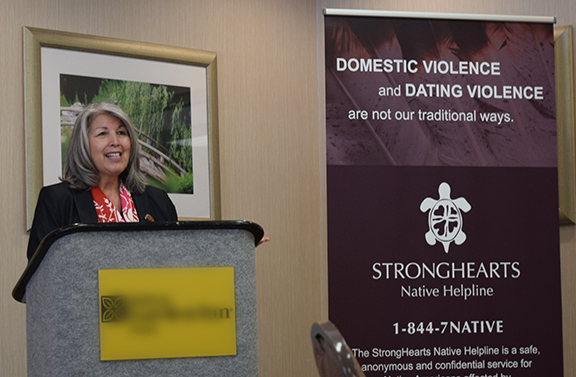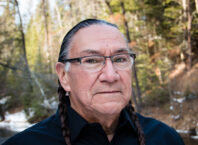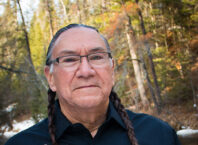
By Maurita Begay
StrongHearts Native Helpline is a national nonprofit organization based in Minnesota dedicated to providing advocacy services for domestic violence and dating violence victims in Native American communities. The organization is a collaborative product of The National Domestic Violence Hotline and the National Indigenous Women’s Resource Center.
The concept of StrongHearts Native Helpline was conceived in 2012 when reports showed that calls from Native American communities were lower in comparison to other communities, despite the well known statistics for higher domestic violence rates in Indian Country.
Staff of The National Domestic Violence Hotline brainstormed ways to better serve the Native American community, “and actually, what advocates from across the country said was, ‘Well, you can’t. You know, that’s not your place – to serve Native Americans. You don’t understand what our lived experience is. You don’t understand what our barriers to justice are.’ And so, they ultimately agreed that it would be most appropriate to form a Native American culturally specific helpline to help Native Americans from our communities,” says Lori Jump, Director of StrongHearts Native Helpline.
According to the StrongHearts Native Helpline website, “Many Native and non-Native domestic violence experts agree that the prevalence of violence in Indian Country is a modern effect of the historical trauma that our people continue to experience… [A 2010 study conducted by the CDC] found that more than four in five American Indian and Alaska Native women had experienced violence in their lifetime, and one in three had experienced violence within the past year.”
StrongHearts Native Helpline was established in March 2017, and operated in Austin, Texas, where The National Domestic Violence Hotline is based, for two years before moving to Minnesota in the Twin Cities region, due to it being an area that has a native population and more accessible native programming.
At first, StrongHearts Native Helpline provided services only by phone. All of StrongHearts Native Helpline’s advocacy services are available daily from 7 a.m. to 10 p.m. Central Time at 1-844-762-8483. If a caller needs services outside of operation hours, they can call The National Domestic Violence Hotline for 24/7 service at 1-800-787-3224.
However, as of May 18, 2020, StrongHearts Native Helpline launched their online chat advocacy services, which provides one-on-one, real-time, confidential sessions with a trained advocate. The launch of this service was pushed forward due to the coronavirus pandemic, as it is a safer method of communication while sheltering in place with an abusive partner. These services can be accessed at https://www.strongheartshelpline.org during operation hours. On the website, there will be a series of non-identifying demographics questions, optional for the user to answer, before pressing the Start Chat button to begin a session. To close a chat at any time, the user can click on the X in the top right corner of the chat window, followed by pressing the End Chat button. To ensure safety, users should clear the online history before withdrawing from their device. The National Domestic Violence Hotline has a similar service available at https://www.thehotline.org.
All advocates of StrongHearts Native Helpline are trained to provide crisis intervention, safety planning, education, advocacy, and referrals to callers, and their training is supplemented with learning how to respond in a culturally sensitive manner in high stress situations. In fact, all of StrongHearts Native Helpline’s advocates are Native American.
“A lot of times they [callers] will ask, ‘Well, are you native?’ And our advocates, we don’t provide a lot of personal information about ourselves, but we will say, ‘Yes. Yeah, I am.’ They brief the caller [about their tribal affiliation] and there’s such a relief that they don’t have to explain their experience. The advocates will often say, ‘And then she just really started to talk and she really opened up when she found out that I was native.’ So, we know just from the reports of our advocates, that our callers really find it valuable to be talking to somebody that understands where they’re coming from,” said Jump.
The culturally sensitive training that all of StrongHearts Native Helpline advocates receive includes historical and cultural background information that helps to understand the conditions that native communities face today. It’s immensely critical that advocates are able to empathize with the struggle to find help in close-knit communities where there is an imminent fear of judgement or rejection from one’s own friends and family.
Jump describes the training. “We talk about Native American spirituality, but we certainly can’t teach that in terms of there being 574 Native American tribes, and we all have our own traditions and ceremonies. And, while there may be similarities, each tribe is different, but we do provide them [advocates] with basic training in that: understanding our relationship to all living things; that respect that all Native American tribes have… And, in my small town, there were many times that the mainstream program, the non-native program, was like, ‘Well, why don’t you just go to your tribe for help?’
Like, they have no concept of how close and tight those communities are and how we’re all related,” said Jump.
Jump said that within the first year of operation, it was quite evident that culturally specific services for Native Americans are sparse. There is a tremendous lack of tribal services provided for domestic violence victims, with only 60 tribal shelters available across the country. This creates an unjust predicament for those who don’t want to or can’t leave their community to find help.
“The majority of people that call us really need that validation and support that our advocates provide… We found that our relatives that call us tend to need more of that. Because our communities are so small, it could be hard to reach out for help in your own community. If they [callers] don’t feel like they can do that, then they need somebody to talk to, and our helpline is completely anonymous and confidential,” said Jump.
Ultimately, the StrongHearts Native Helpline’s mission is to empower and validate each of their callers needs, and to educate them about domestic violence and their options available for handling their situation. They are also committed to providing ongoing support and connecting callers back to a service that’s in their community. And, although their expertise is in domestic violence, StrongHearts Native Helpline advocates do confer callers with other needs and find appropriate support for them.
The Helpline is the first and only national helpline available exclusively for Native Americans, and they plan to continue their development. Looking forward, the organization will be training advocates to respond to sexual violence, as there is not a national helpline service available to Native Americans for this matter yet. It is scheduled to launch in late summer. They also hope to hire enough advocates to become a 24/7 service for our relatives by fall. As the StrongHearts Native Helpline works to recruit more advocates, they continue to be a vital service created by Native Americans for Native Americans.
For more information about StrongHearts Native Helpline, or to chat online with a trained advocate during operation hours, you can visit https://www.strongheartshelpline.org.
Advocacy services can also be accessed by calling 1-844-762-8483 from 7 a.m. to 10 p.m. Central Standard Time.
To find more information about The National Domestic Violence Hotline, or to chat online with a trained advocate, see https://www.thehotline.org.
Advocacy services can also be accessed by calling 1-800-787-3224. The National Domestic Violence Hotline, a 24/7 service.
To learn about safely using the online chat advocacy services, read “Behind the Screens: Reducing Tech Footprints” by the National Domestic Violence Hotline. The information is at https://bit.ly/2BhRXL9.
To learn more about the National Indigenous Women’s Resource Center, whose mission is dedicated to restoring sovereignty and safeguarding native women and children, visit https://www.niwrc.org.





